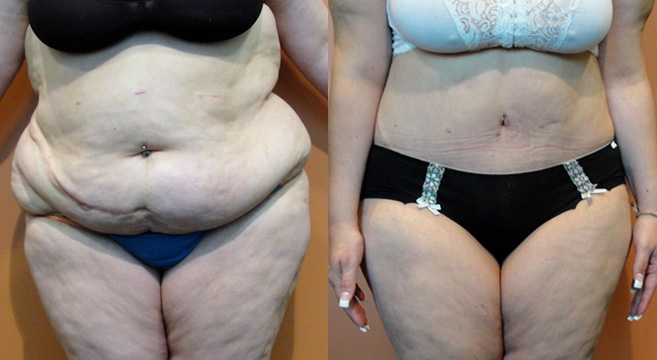Body Mass Index Can Significantly Influence the Abdominoplasty Results
When considering abdominoplasty it’s essential to understand how your Body Mass Index (BMI) can influence the outcome. The BMI, which is a measure of body fat based on height and weight, plays an important role in determining the safety and effectiveness of abdominoplasty. It’s important to understand that your BMI can impact not only the surgical process but also the post-operative recovery and the longevity of the results. A higher BMI, for instance, might increase the risk of complications, whereas a lower, stable BMI could lead to more favourable outcomes.
In this blog, Sydney-based Plastic Surgeon Dr Jake Lim will explore this important aspect of abdominoplasty. Dr Lim, renowned for his experience in cosmetic surgery, offers valuable insights into how an individual’s Body Mass Index (BMI) influences the results of abdominoplasty.
Download Dr Lim’s 2024 Abdominoplasty Guide

What is BMI and Why Does It Matter?
Body Mass Index (BMI) is a numerical value derived from an individual’s weight and height. It’s a widely used tool to categorise individuals into different weight categories. The formula for calculating BMI is weight in kilograms divided by the square of height in meters.
The World Health Organisation defines various BMI categories:
- Underweight: Less than 18.5
- Normal weight: 18.5–24.9
- Overweight: 25–29.9
- Obesity: BMI of 30 or more
These categories help in assessing the general health risks associated with body weight. It’s important to note that while BMI is a useful indicator, it does not account for muscle mass, bone density, overall body composition, and racial and sex differences.
In surgical practices, particularly in procedures like tummy tuck – abdominoplasty, BMI is a critical factor. It’s used to assess the risk of surgical complications, such as infection, poor wound healing, and blood clots. Moreover, BMI can influence the surgical technique and the overall safety of the procedure. Higher BMI is associated with increased risk during any surgical procedure, including abdominoplasty. This is due to the higher likelihood of comorbid conditions like diabetes, heart disease, and hypertension, which can complicate both the surgery and recovery process.
The success of a tummy tuck – abdominoplasty is not just measured by the surgery itself but also by the satisfaction with the aesthetic outcomes. Individuals with a lower BMI tend to have less visceral fat (fat around internal organs), which allows for more effective contouring and tightening of the abdominal wall. Conversely, a higher BMI might limit the extent of visible improvement.
Post-surgery, individuals with a higher BMI may face longer healing times and a higher risk of complications like seroma (fluid accumulation) or wound dehiscence (wound separation) and blood clots (Deep vein thrombosis and pulmonary embolus). These risks necessitate a more cautious approach to recovery and potentially more extensive post-operative care.
Pre-Surgical Evaluation and BMI Optimisation
- Medical Evaluation and Health History: Prior to abdominoplasty, a thorough medical evaluation is imperative. This includes a detailed discussion of your health history, current medications, and any previous surgeries. This evaluation helps in determining whether you’re a suitable candidate for the procedure and what precautions need to be taken
- Understanding the Role of BMI in Surgical Suitability: Dr Lim recommends that patients be at or near their ideal weight, with a BMI preferably below 30, before undergoing abdominoplasty. This is not just for aesthetic reasons, but also to reduce surgical risks and improve healing
- Discussing Expectations and Realistic Outcomes: It’s better to have an honest conversation with Dr Lim about your expectations. If your BMI is higher, you may need to adjust your expectations regarding the surgical outcomes, as well as understand the potential for increased risks
Strategies for Optimising BMI Pre-Surgery
- Lifestyle and Dietary Changes for BMI Improvement: If your BMI is higher than recommended, Dr Lim will advise you to lose weight before the surgery. This often involves adopting a healthier diet and regular exercise routine
- Importance of Achieving a Stable and Healthy BMI: Stability in weight is key. Fluctuations in weight, especially after surgery, can affect the results. Achieving and maintaining a stable, healthy BMI not only makes the surgery safer but also helps in maintaining the results long-term
- The Role of Exercise in Preparing for Surgery: Regular exercise not only aids in weight loss but also improves overall fitness, which can contribute to a smoother surgery and recovery. Engaging in a mix of cardiovascular and strength training exercises is often recommended

The Surgical Process and Its Relation to BMI
- Adapting Surgical Techniques Based on BMI: In some cases, Dr Lim needs to modify his techniques when performing abdominoplasty on individuals with higher BMIs. This might include longer incisions, additional contouring procedures, or even staged surgeries to manage the increased tissue volume and improve safety
- Managing Expectations: What Your BMI Means for the Surgery: It’s important to understand that a higher BMI can limit the extent of improvement you can expect from abdominoplasty. Dr Lim can remove excess skin and fat and tighten muscles, but the presence of visceral fat (which cannot be surgically removed) may prevent achieving a flat abdomen
- Addressing Challenges in Higher BMI Patients: Patients with a higher BMI face unique challenge, including an increased risk of blood clots and wound-healing complications. Dr Lim may employ specific strategies such as using compression garments, longer hospital stays, or special wound care techniques to mitigate these risks
Post-Operative Care and BMI
- Impact of BMI on Recovery and Healing: Post-operative recovery can be more challenging for individuals with higher BMIs. They may experience slower wound healing, a higher risk of infection, and the need for extended care and monitoring
- Adjusting Post-Operative Care Based on BMI: Post-surgery care plans are often tailored to the individual’s BMI. This might include extended use of drainage tubes, specialised dressings, or more frequent follow-up visits to monitor healing and address any complications promptly
- Long-Term Results and Maintaining a Healthy BMI: Long-term satisfaction with abdominoplasty results is closely tied to maintaining a stable, healthy BMI. Significant weight fluctuations after surgery can alter the results, leading to stretched skin or uneven contours. Continuous management of weight and fitness is essential for preserving the surgical outcomes
The Role of BMI in Long-Term Satisfaction after Abdominoplasty
After undergoing a tummy tuck – abdominoplasty, it’s important to understand how your Body Mass Index (BMI) continues to play a significant role in your satisfaction with the results over the long term.
The longevity of your tummy tuck – abdominoplasty results is closely linked to your BMI. Here’s how:
- Stable Weight Maintains Results: Keeping your weight stable helps to maintain the results of your tummy tuck – abdominoplasty. Significant weight changes can alter the appearance of your abdomen
- Effects of Weight Gain: Gaining weight post-surgery can stretch the abdominal skin and muscles, potentially undoing the benefits of the tummy tuck – abdominoplasty
- Effects of Weight Loss: Similarly, losing a lot of weight after the procedure can result in excess, sagging skin
How Lifestyle Changes Post-Surgery Can Affect BMI and Results
Adopting a healthy lifestyle after your tummy tuck – abdominoplasty is very important for multiple reasons:
- Regular Exercise: Incorporating regular physical activity helps in maintaining your post-surgery results. It keeps your muscles toned and your weight in check
- Balanced Diet: Eating a balanced, nutritious diet is key. It not only helps in managing your weight but also in healing and maintaining skin quality
- Avoiding Yo-Yo Dieting: Consistency in your diet and exercise routine is essential. Frequent weight fluctuations can negatively impact the results of your surgery
Post-surgery, it’s important to keep an eye on your BMI and manage it effectively:
- Regular Health Check-ups: Regular visits to your healthcare provider can help in monitoring your overall health and BMI. This is important to ensure that your weight and health stay on track
- Lifestyle Adjustments: Be prepared to make long-term lifestyle adjustments. This might mean sticking to a healthier diet or staying active consistently
- Monitoring Body Changes: Stay aware of any changes in your body. If you notice significant weight gain or loss, it might be time to reassess your lifestyle and dietary habits
FAQs about How Your BMI Impacts Abdominoplasty Results

Can I have abdominoplasty if my BMI is above 30?
- Yes, it is possible to undergo abdominoplasty with a BMI above 30, but it’s important to be aware of the increased risks. Dr Lim may recommend weight loss to reduce these risks and improve the aesthetic results. Each case is evaluated individually, considering the patient’s overall health and specific circumstances.
Will weight fluctuations after abdominoplasty affect my results?
- Yes, significant weight fluctuations after abdominoplasty can impact the results. Gaining weight can stretch the skin and abdominal muscles, potentially reversing the benefits of the surgery. Similarly, substantial weight loss after the procedure can lead to additional loose skin. Maintaining a stable weight is key for lasting results.
How does BMI affect the type of abdominoplasty procedure I can have?
- Your BMI can influence the type of abdominoplasty procedure that’s most suitable for you. For example, individuals with a lower BMI might be good candidates for a mini-abdominoplasty, which is less extensive, while those with a higher BMI might require a full abdominoplasty for optimal results. Dr lim will recommend the best approach based on your BMI and specific body contours.
Is the recovery time longer for individuals with higher BMI after abdominoplasty?
- Recovery time can be longer and more complex for individuals with a higher BMI. This is due to the increased risk of complications such as infections or slow wound healing. It’s important for patients with higher BMIs to closely follow Dr Lim’s post-operative care instructions and attend all follow-up appointments.
Does a lower BMI guarantee better results in abdominoplasty?
- While a lower BMI is generally associated with better outcomes and fewer complications in abdominoplasty, it doesn’t necessarily guarantee “better” results. The outcome depends on various factors, including the individual’s skin quality and muscle tone. A complete evaluation is needed to determine the potential results for each individual.
Further Reading about Abdominoplasty with Dr Jake Lim
- Read more about Will I Still Have Abdominal Rolls or Folds After Abdominoplasty Surgery?
- Read more about 7 Things You Need to Know about Pregnancy after Abdominoplasty
- Read more about Fleur de Lis Abdominoplasty
- Read more about Medicare Cover for Abdominoplasty Surgery in Sydney
- Read more about Recovery after Tummy Tuck – Abdominoplasty
- Read more about Preparing for Your Abdominoplasty
Medical References about Abdominoplasty
- Pregnancy After Abdominoplasty – NCBI
- Pregnancy One Month Post Abdominoplasty: A Case Report and Review – NCBI
- Changes to Abdominal Muscles After Pregnancy May Affect ‘Abdominoplasty’ Results – American Society of Plastic Surgeons
- The Effect of Body Mass Index on Outcome of Abdominoplasty – NCBI
- ‘Tummy Tuck’ Improves Quality of Life in Overweight/Obese Patients – American Society of Plastic Surgeons




